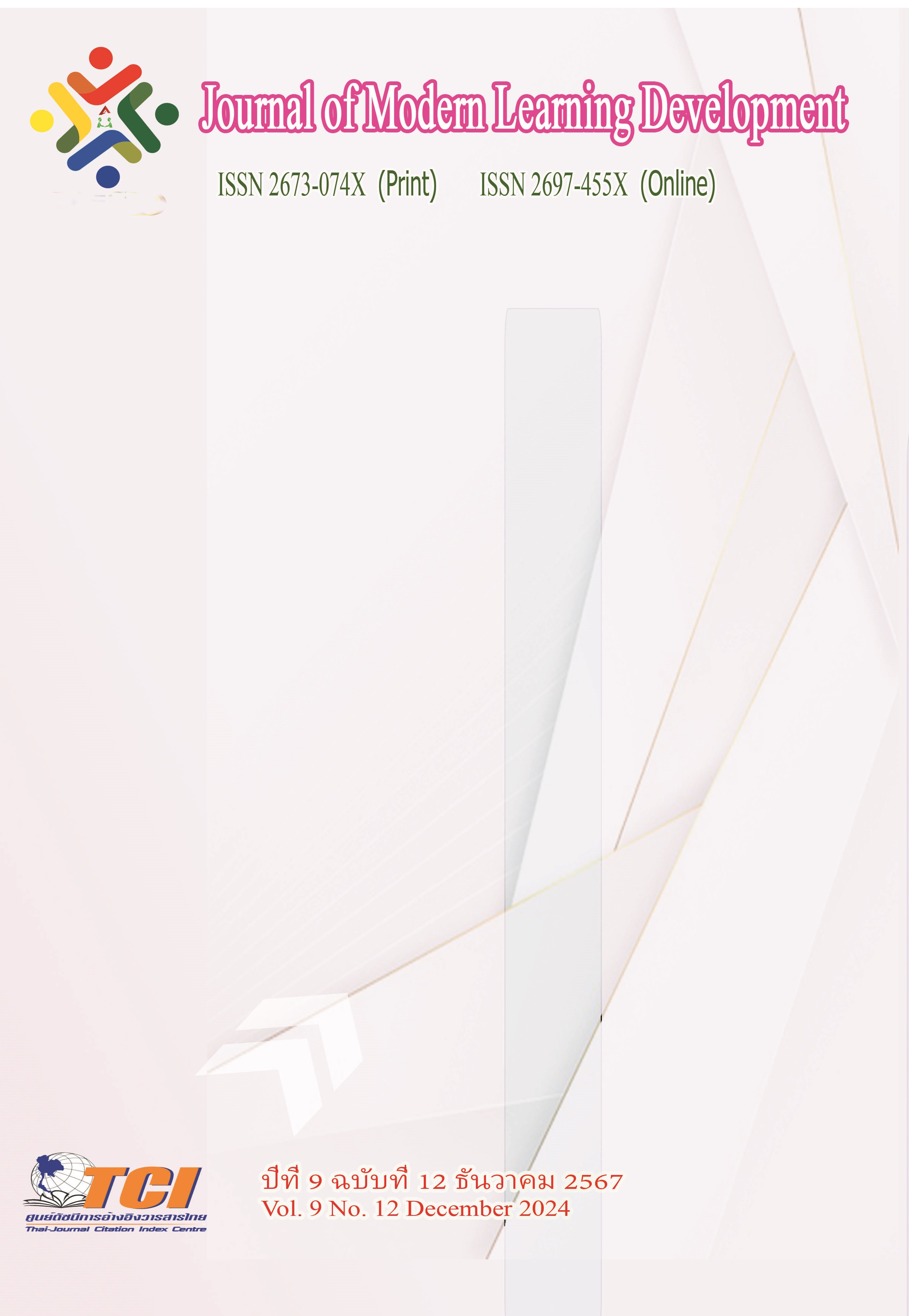The Impact of Information Quality on the Investment Decision-Making Behavior of Chinese Institutional Investors From the Perspective of AIEmpowerment
Main Article Content
Abstract
The objectives of this research were: 1) To study the impact of company information quality in the securities market on the investment decision-making behavior of institutional investors. 2) To explore how information quality affects investment decisions through perception and identification. 3) To analyze the impact of the weight of information quality in the securities market on the investment behavior of institutional investors. 4) To analyze the impact of AI-enabled information quality on the long-term investment behavior of institutional investors.
The sample consisted of 448 fund managers and researchers in Beijing who influence investment decision-making. They were selected by the snowball sampling method. The research instruments for the data collection were a combination of on-site distribution and electronic questionnaires. The statistics for data analysis included SPSS 27.0 and AMOS 24.0 for reliability analysis and confirmatory factor analysis, including tests for content validity, convergent validity, and discriminant validity.
The research results were found as follows: 1) The quality of company information in the securities market has a significant impact on investment decision-making behavior. 2) AI-enabled information quality has a significant impact on investment decision-making behavior. 3) The quality of company information in the securities market has a significant impact on perceptual identification. 4) Artificial Intelligence empowerment has a significant impact on perceptual recognition. Suggestions for further research include expanding the scope to include institutional investors from different regions and industries, conducting longitudinal studies to explore causal relationships, and investigating the impact of AI on other aspects of the financial market such as risk management and market efficiency.
Article Details
References
Baker, M., & Wurgler, J. (2006). Investor sentiment and the cross-section of stock returns. Journal of Finance, 61 (4), 1645-1680.
Cannon, W. B. (1927). The James-Lange theory of emotions: A critical examination and an alternative theory. American Journal of Psychology, 39 (1/4), 106-124.
Chen, H. (2021). Investment decision behavior. XYZ Publishing.
Crosby, P. B. (1994). Quality is free: The art of making quality certain. McGraw-Hill.
Evans, J. R., & Lindsay, W. M. (2002). The management and control of quality. South-Western.
Hayes, A. F. (2009). Beyond Baron and Kenny: Statistical mediation analysis in the new millennium. Communication Monographs, 76 (4), 408-420.
James, W. (1884). What is an emotion? Mind, 9 (34), 188-205.
Juran, J. M. (1992). Juran on quality by design: The new steps for planning quality into goods and services. Free Press.
Kahneman, D. (2003). A perspective on judgment and choice: Mapping bounded rationality. American Psychologist, 58 (9), 697-720.
Kahneman, D., & Tversky, A. (1979). Prospect theory: An analysis of decision under risk. Econometrica, 47 (2), 263-291.
Kline, R. B. (1998). Principles and practice of structural equation modeling. Guilford Press.
Kline, R. B. (2005). Principles and practice of structural equation modeling (2nd ed.). Guilford Press.
Li, X., Wang, Y., & Chen, H. (2021). AI-driven financial information processing. Journal of Financial Economics, 141 (2), 567-593.
Liao, S., & Li, Z. (2023). The role of AI in financial decision-making. Journal of Financial Technology, 15 (3), 245-268.
MacCallum, R. C., Browne, M. W., & Sugawara, H. M. (1996). Power analysis and determination of sample size for covariance structure modeling. Psychological Methods, 1 (2), 130-149.
Myers, D. G. (2019). Psychology (12th ed.). Worth Publishers.
Ni, W., & Dan, H. (1996). The interaction between information quality and user satisfaction. Information Systems Research, 7 (2), 182-201.
Odean, T. (1998). Are investors reluctant to realize their losses? Journal of Finance, 53 (5), 1775-1798.
Rieh, S. Y. (2002). Judgment of information quality and cognitive authority in the Web. Journal of the American Society for Information Science and Technology, 53 (2), 145-161.
Schachter, S., & Singer, J. E. (1962). Cognitive, social, and physiological determinants of emotional state. Psychological Review, 69 (5), 379-399.
Simon, H. A. (1956). Rational choice and the structure of the environment. Psychological Review, 63 (2), 129-138.
Smith, J. (2020). Investment decision-making: Theory and practice. ABC Publishers.
Smith, J. (2021). Artificial intelligence in finance. DEF Publishers.
Steiger, J. H. (2007). Understanding the limitations of global fit assessment in structural equation modeling. Personality and Individual Differences, 42 (5), 893-898.
Strong, D. M., Lee, Y. W., & Wang, R. Y. (1997). Data quality in context. Communications of the ACM, 40 (5), 103-110.
Tajfel, H., & Turner, J. C. (1979). An integrative theory of intergroup conflict. In W. G. Austin & S. Worchel (Eds.), The social psychology of intergroup relations (pp. 33-47). Brooks/Cole.
Wang, R. Y., & Strong, D. M. (1996). Beyond accuracy: What data quality means to data consumers. Journal of Management Information Systems, 12 (4), 5-33.
Wen, Z., Hou, J., & Zhang, L. (2004). Testing and application of the mediating effects. Acta Psychologica Sinica, 36 (5), 614-620.
Wolfram, S. (2023). AI and the future of financial markets. GHI Publishers.
Xue, J. Y. (2019). Behavioral finance and AI integration in China. XYZ Publishing.
Zhang, Y. (2006). The impact of information quality on decision-making processes. Journal of Information Systems, 20 (4), 15-30.
Zou, L. (2023). Financial innovation with AI-generated content. Journal of Financial Innovation, 10 (2), 178-195.


